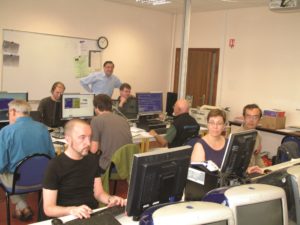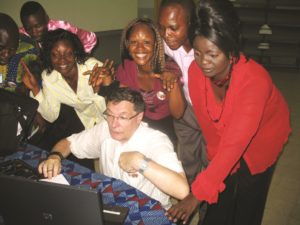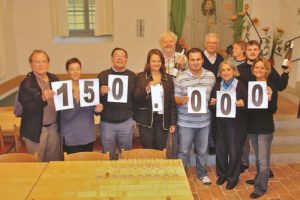The MUSICA International Project Now Fully Interactive With the Virtual Choral Library
By Jean Sturm, Executive Director of Musica International
Accessibility of information on the choral repertoire has completely changed during the last twenty years. Who could have imagined, when the first records of what is now Musica were input thirty-five years ago on a minicomputer using a teletype, that this would ultimately lead to a unique information tool on choral music, on which would be immediately available to everyone, everywhere, even on a smartphone?
Musica is a ‘service’ of the IFCM to the world choral community, through the Musica International association, and available in English, French, German and Spanish. The association was created in 1998 by the IFCM and the Centre d’Art Polyphonique d’Alsace. It currently has thirty-six institutional members all over the world, and its mode of operation is cooperative. The input of data is entrusted to the key players in the choral universe: choral federations, composers, publishers, conductors, universities, music libraries and others.
The Choral Database and Virtual Library
Musica’s ongoing task is to develop a comprehensive cognitive database, an idea which first saw the light of day back in 1982. The database is a choral music research and teaching tool for the benefit of conductors, musicologists, music schools, choral federations, retailers and many others. It is also perfect for amateur musicians who are eager to discover and enjoy the choral repertoire.
At present, Musica contains descriptions of more than 165,000 titles, biographies of 30,000 composers and links to over 2,000 publishers of choral music. It is Musica’s ambition to be the leading virtual library of choral music, a resource containing all possible information about a score.
To be comprehensive, the project covers all levels:
- Description of the score: structured in over a hundred different categories of information (composer, arranger, publisher, title, genre, form, difficulty, type of choir, language, instrumentation, keywords, etc.), with automatic translations. More than 200,000 multimedia links also provide a fuller understanding of the chosen piece: image of one or more pages of the score, full text, a translation in several languages, a sound clip or video or both of a good interpretation, a sound file giving the pronunciation by a native speaker, a midi file, and external links. As well as being a tool for designing choral programs, therefore, Musica is also a way of taking pleasure in music.
- Coverage of the choral repertoire: pieces for children’s, male, female or mixed-voice choirs, Gregorian chant, traditional songs, Bach chorales, pop music, choral jazz, the classical greats, opera choruses … all of these live happily side by side.
- Origins of the music: the spread of the project to all continents has made it increasingly multicultural, with equal importance given to all choral heritages.
The Website http://www.musicanet.org
The entire Musica website is available in four languages. Alongside the database with its infinite scope for searches, three highly-appreciated features in particular make it worthwhile to visit at least once a month:
- the favorite piece of the month: every month, a musical committee selects thepiece that every conductor of the world would take to a desert island, if only one could be taken. In this way an anthology is being built up containing highlights of international interest which all conductors can harvest.
- the ‘Auditorium’: an alphabetical list of thousands of choral sound clips and videos.
- the anniversaries of composers: a list of composers whose key anniversaries will be celebrated during the next three years. Another mine of information for those planning ahead.

Now Fully Interactive
Beyond just benefiting from Musica, anyone can now contribute actively to its development.
- The online Musica WIKI adds an open space to each title. Every composer, publisher, conductor, musicologist or music lover can add comments, information or performance reports to their chosen piece.
- Uploading multimedia files: files lying dormant in a local computer drive can now be given a new lease of life – worldwide. By sharing, say, the text of a piece, its translation, pronunciation files or a concert recording, anyone can contribute to the cooperative virtual library.
- Direct online input of data: anyone can now participate in enriching the database. Composers can input their compositions, publishers their publications and conductors their favorite pieces if they are not yet described. To do this, a software can be downloaded from musicanet.org (just follow the on-site explanations). Other possibilities for data entry exist, such as merging Excel files. Contact office@musicanet.org.
- Managing personal music holdings inside Musica: no need to purchase software or create a local database. Search for the corresponding record, which already contains detailed information, and just add personal data (location of the score…) in your own private fields. If a piece is not yet referenced, your entries will mean a new record in the database, helping to expand Musica in a win-win situation. Find out more by writing to office@musicanet.org.
- A network of correspondents: if you are interested in contributing actively to the extraordinary adventure that has been ours for over thirty years and have skills that could help Musica to move forward, please get in touch with the coordination office.
The Musica Workshops
Although online input is now possible, Musica organizes ‘working sessions’ in which any conductor, musicologist, composer, publisher or music librarian is welcome to take part. These are always great opportunities for pooling specialized choral knowledge, optimizing the input of participants’ own works or publications, taking advantage of local capacities, improving existing records, recording pronunciations, all in a very friendly and collegial atmosphere with other enthusiasts. The work does not exclude sightseeing or indulging in the local cuisine, on the contrary. A list of upcoming sessions is displayed on the website. Musica is also looking for people ready to organize sessions in order to cover the specific choral repertoire of a country.

Full Privileged Access
Professional users of www.musicanet.org wish to get more than is available through standard free access to the documentary information.
Musica therefore offers the possibility of full privileged access, with no limitations:
- Like any non-profit organisation, Musica International needs financial support, even small. Our appreciation is shown by giving donors full privileged access.
- Choral federations or choral directors’ associations that are members of Musica can offer global privileged access to all their members. For more information, contact the Musica office.
- The professional subscription is specially designed for music libraries. Moreover, Musica can provide global privileged access to an institution or even a whole campus by automatic recognition of all its computers, with no need to log in. And there are additional advantages for libraries. Convince your library to subscribe and benefit from its full access.
The road towards complete coverage of the global choral repertoire is still long. Take full advantage of what has already been achieved. And maybe you would like to contribute a brick to the edifice? The more of us share in the development of Musica, the more and the faster we will reap the rewards.

- You can subscribe to the MusicaMail newsletter online
- More information at http://www.musicanet.org or +33 3 88 36 17 54
- To contact the international coordination office: office@musicanet.org
Edited by Gillian Forlivesi Heywood, Italy